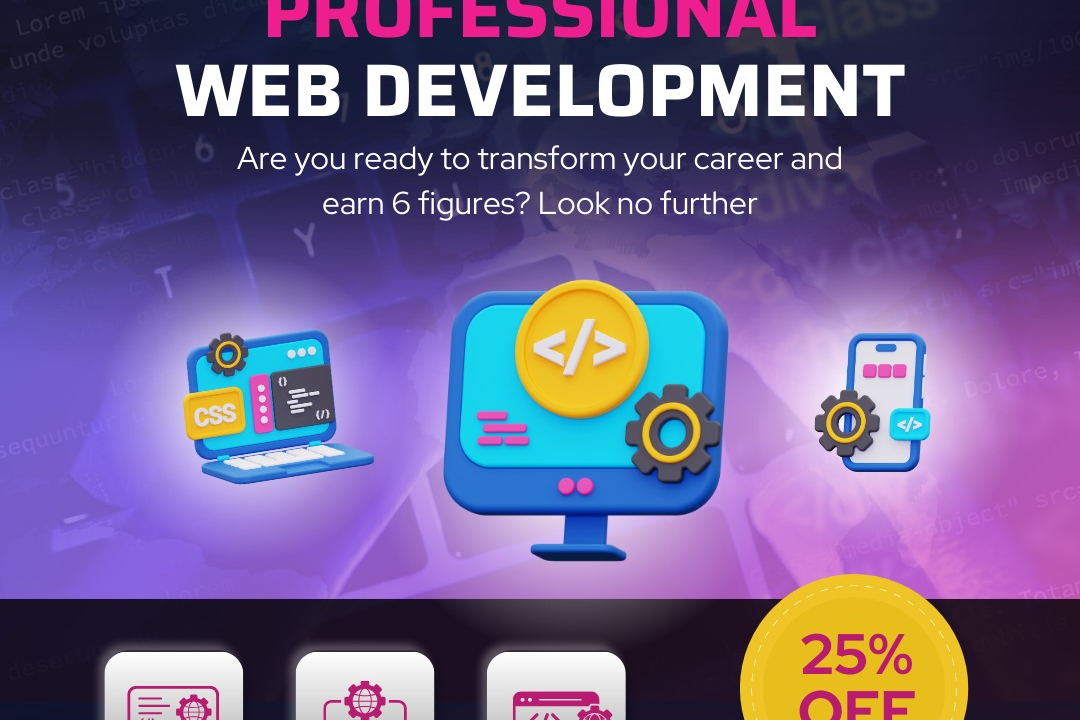Execute A Php Program In Usb Xampp Portable
Executing a PHP program from a USB XAMPP portable involves running your PHP scripts locally on any W
Execute A Php Program In Usb Xampp Portable
Executing a PHP program using USB XAMPP portable offers the convenience of running a full-fledged development environment on any Windows computer without installation. It allows developers and students to carry their PHP projects, along with the necessary server setup, on a USB drive, enabling quick testing and deployment on multiple systems. This portability is especially useful for remote work, training sessions, or situations where software installation permissions are limited, ensuring seamless and efficient access to a local PHP environment anytime, anywhere.
To Download Our Brochure: https://www.justacademy.co/download-brochure-for-free
Message us for more information: +91 9987184296
Executing a PHP program using USB XAMPP portable offers the convenience of running a full fledged development environment on any Windows computer without installation. It allows developers and students to carry their PHP projects, along with the necessary server setup, on a USB drive, enabling quick testing and deployment on multiple systems. This portability is especially useful for remote work, training sessions, or situations where software installation permissions are limited, ensuring seamless and efficient access to a local PHP environment anytime, anywhere.
Course Overview
Learn how to configure and run PHP programs using USB XAMPP Portable, enabling portable, hassle-free development and testing on any Windows computer without installation.
Course Description
This course teaches you how to configure and execute PHP programs using USB XAMPP Portable, enabling portable web development and testing on any Windows system without installation.
Key Features
1 - Comprehensive Tool Coverage: Provides hands-on training with a range of industry-standard testing tools, including Selenium, JIRA, LoadRunner, and TestRail.
2) Practical Exercises: Features real-world exercises and case studies to apply tools in various testing scenarios.
3) Interactive Learning: Includes interactive sessions with industry experts for personalized feedback and guidance.
4) Detailed Tutorials: Offers extensive tutorials and documentation on tool functionalities and best practices.
5) Advanced Techniques: Covers both fundamental and advanced techniques for using testing tools effectively.
6) Data Visualization: Integrates tools for visualizing test metrics and results, enhancing data interpretation and decision-making.
7) Tool Integration: Teaches how to integrate testing tools into the software development lifecycle for streamlined workflows.
8) Project-Based Learning: Focuses on project-based learning to build practical skills and create a portfolio of completed tasks.
9) Career Support: Provides resources and support for applying learned skills to real-world job scenarios, including resume building and interview preparation.
10) Up-to-Date Content: Ensures that course materials reflect the latest industry standards and tool updates.
Benefits of taking our course
Functional Tools
1 - USB XAMPP Portable: This is a pre configured, lightweight web server package that includes Apache, MySQL, PHP, and other essential components, all bundled into a portable version that runs directly from aUSB drive without requiring installation. It provides students with a ready to use environment to run and test PHP programs on any Windows machine, ensuring consistency across different setups. Its portability minimizes setup time and simplifies troubleshooting, making it ideal for training sessions. Students learn how to deploy, configure, and utilize this tool for real world web development projects, gaining practical experience in managing a portable server environment.
2) Text Editors (such as Notepad++, Sublime Text, Visual Studio Code): These are essential tools for writing, editing, and managing PHP code efficiently. Text editors like Visual Studio Code offer syntax highlighting, code completion, and debugging support, which enhance the coding experience. During the course, students are introduced to these editors to write clean, organized, and error free PHP scripts. Learning to use such editors improves productivity and fosters good coding practices, enabling students to develop robust applications within their portable environment.
3) Web Browser (Chrome, Firefox, Edge): Web browsers are critical for testing and previewing PHP applications in real time. The course demonstrates how to run PHP scripts and view results dynamically within these browsers. Students will learn how different browsers can interpret web pages, recognize errors, and ensure cross browser compatibility. This practical experience helps learners understand how their PHP code interacts with the web view, enabling them to debug and optimize their projects effectively.
4) Command Line Interface (CLI): The command prompt or terminal provides students with the ability to run PHP commands directly, execute scripts quickly, and manage server configurations. Learning CLI usage is vital for understanding server side scripting, database management, and environment control. Students are trained in navigating directories, executing PHP scripts, and automating repetitive tasks using CLI commands within the portable environment, gaining skills that are valuable for professional development and troubleshooting.
5) PHP Interpreter: PHP itself is an open source scripting language that interprets and executes the code written by developers. The course emphasizes understanding how PHP processes scripts, converts them into executable code, and outputs dynamic web content. Students experiment with PHP syntax, functions, and modules, gaining insight into backend programming. Mastery of PHP interpretation enables learners to develop complex applications, optimize performance, and troubleshoot issues effectively in their portable setup.
6) Database Tools (phpMyAdmin or MySQL Command Line): Since many PHP applications rely on databases, the course introduces students to database management tools like phpMyAdmin, which provides a user friendly web interface, or direct MySQL command line interaction. Students learn how to create, modify, and query databases, store user data, and manage relationships within their portable environment. This skill is crucial for building dynamic, data driven applications and understanding back end data handling.
7) Version Control System (Git): Git is a fundamental tool for tracking changes, collaborating effectively, and maintaining code integrity. The course teaches students how to initialize repositories, commit changes, branch, and manage code versions within their portable PHP environment. Integrating Git helps students adopt best practices in software development, prepares them for collaborative projects, and simplifies code recovery and history tracking.
8) Networking Tools: These include basic understanding of network configurations, IP setup, and port management within the portable environment. Students learn how to ensure their server is accessible within their local network or remotely, enabling testing across multiple devices. Proper network setup is essential for collaborative projects and understanding how web applications are deployed and accessed.
9) Troubleshooting Utilities: Tools such as log analyzers, error viewers, and system monitors help students identify and resolve issues within their portable environment. Understanding how to read server logs, debug PHP errors, and monitor resource usage equips students with the necessary skills to maintain their development setup efficiently, ensuring minimal downtime and optimal performance.
10) External Libraries and Frameworks: These include additional PHP libraries, APIs, or frameworks like Laravel or CodeIgniter, which students can integrate into their portable setup to build advanced applications. Learning how to install, configure, and utilize these tools prepares students for modern development workflows, encouraging building scalable and maintainable software solutions within a portable environment.
11 - Integrated Development Environments (IDEs): Tools like Visual Studio Code, PHPStorm, Sublime Text, or NetBeans provide advanced features such as debugging, code refactoring, and code analysis. These IDEs streamline the development process by offering intelligent code assistance and project management capabilities directly within the portable setup, enhancing student productivity and code quality.
12) Web Server Configuration Tools: Utilities or panels (like XAMPP Control Panel) that allow students to start, stop, and configure web services such as Apache and MySQL. These tools help students learn to manage server settings, enable or disable modules, and troubleshoot server issues, which are crucial skills in real world web server management.
13) SSL/TLS Simulation Tools: Basic tools or self signed certificates setup within the portable environment to teach students secure communication principles. Learning to configure HTTPS helps students understand encryption, secure data transfer, and security best practices critical for deploying real world web applications.
14) Performance Testing Tools: Simple benchmarking utilities or scripts to evaluate server response times and application load capacity. These tools help students analyze the performance of their PHP applications within their portable setup, preparing them to optimize code and infrastructure for better scalability.
15) Automated Testing Frameworks: Lightweight testing tools or scripts (like PHPUnit) integrated into the portable environment to facilitate unit testing and code validation. Educating students on automated testing fosters a discipline that ensures application reliability and maintainability.
16) Deployment Tools: Scripts or utilities that assist in deploying PHP applications from the local environment to other servers or cloud platforms. Familiarity with deployment processes prepares students for real world scenarios of launching and maintaining web applications.
17) Documentation and Code Commenting Tools: Features within IDEs or external applications that aid in maintaining comprehensive documentation and well commented codebases. These practices improve code readability and collaborative development, essential skills in professional settings.
18) Learning and Resource Platforms: Access to integrated tutorials, cheat sheets, and online documentation within the portable environment, enabling students to learn and troubleshoot independently. Immediate access to resources accelerates learning and supports self guided exploration.
19) Backup and Recovery Utilities: Simple tools or scripts for backing up server configurations, databases, and code repositories. Teaching students about data backup strategies ensures development work is protected against data loss or corruption.
20) Cross Platform Compatibility Testing Tools: Utilities that simulate different operating systems or browser environments, allowing students to verify application behavior across diverse setups. This prepares learners for creating universally accessible web applications.
21 - Containerization and Virtualization Tools (Advanced): Basic introduction to using Docker or VirtualBox within the portable environment to simulate complex deployment scenarios and testing environments, fostering skills in modern DevOps practices.
22) Educational Modules and Interactive Labs: Pre configured environments with guided exercises, quizzes, and project workflows that reinforce learning objectives and enable hands on practice within the portable setup.
23) Customizable Templates and Boilerplates: Starter code templates for common web application features, which help students accelerate project development and understand best coding practices.
These expanded points aim to provide a comprehensive toolkit within the portable environment, enriching the learning experience and equipping students with real world skills in web development, server management, and application deployment.
Browse our course links : https://www.justacademy.co/all-courses
To Join our FREE DEMO Session:
This information is sourced from JustAcademy
Contact Info:
Roshan Chaturvedi
Message us on Whatsapp:
Email id: info@justacademy.co
DAL BAL Programming Structure in PHP
Selenium And Python Testing Course At Bangalore
Laravel Interview Questions And Answers For 2 Year Experience












